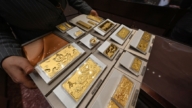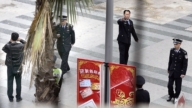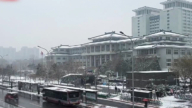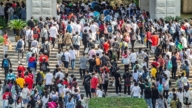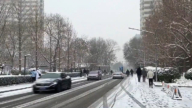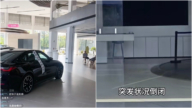【新唐人2012年5月8日讯】进入5月,中国几个城市的白菜价格大涨,有些地方甚至贵过猪肉。老百姓纷纷叹息“吃不起”,专家分析,“菜价飞涨”反映“通货膨胀”压力增大,症结主要是政府刺激经济的政策。
5月4号,济南的一家超市里,消费者发现,五花肉才10元一斤,可是一棵白菜却卖到15元,都顶得上一斤半猪肉了。
北京“东方艾格农业”分析师马文峰表示,从价格监测的情况看,农产品的价格确实是涨了不少。
北京“东方艾格农业”分析师马文峰“4月30号最近一循的价格是涨了70%,青菜、大白菜是涨了95%,也超过去年猪肉的涨幅了。5月10号,农产品的价格指数,菜篮的价格指数是205,是历史的新高。”
马文峰指出,大白菜的产销旺季在秋末冬初,因此,一般白菜5月的价格比旺季时候稍贵,但目前的涨势的确很猛,是通货膨胀造成的。
马文峰“实际上现在你要到产地去看,那个菜价也已经回落了不小了。但是就因为现在这个通货膨胀这个结果,从农业生产者手中,到消费者终端,价格加价比较多。所以作为咱们在城市终端的价格上来看,确实是,还是非常非常的高的。”
往年,到了5月各种蔬菜纷纷上市,菜价低廉期会一直持续到10月份,现在却出现了仅次于去年冬季的坚挺期,这种非同寻常的状况,给各地的老百姓生活带来了很大的困难。
广东市民陈先生“现在就是民怨沸腾啦,不光是菜价,水啦、电啦、煤气啦,这些全部都涨价了,而且一涨都涨的50%以上。什么都涨价,就是工资不涨,那你说怎么生活啊?”
上海访民金月花 “就是老百姓的工资来比,我们肯定是生活不下去的。因为你想一想,买一样西兰花这类的东西都要6、7块钱一斤。说穿了一句,我们自己交水电煤都不够,不要说这些增长的东西了。”
中国国内媒体分析,近期两次油价上涨、以及农产品流通中间环节多,是白菜价格疯涨的部分原因。蔬菜从农民“菜园子”到市民“菜篮子”,一般要经过“菜农-小贩-产地批发商-长途运输户-销地批发商-小贩-市民”等多个中间环节,每个环节至少加价5%。尤其是“最后一公里”,有时菜价会上涨一倍。
但是马文峰根据监测分析,虽然4月份居民消费价格指数(CPI)有所回落,但5月份马上又涨上去了,他说,最主要的原因还是通货膨胀。
马文峰: “按正常情况来看,5月份应该菜价是回落的。这个就是说,它这个通货膨胀在继续加强。这个可能和央行近期的货币政策还是有关的。央行整个儿就是钞票一多发,前脚发钞票,那后脚物价就上涨。”
马文峰指出,单靠发行钞票刺激经济的做法其实不合适。
马文峰: “实际上现在关键是政策上来看,它不应该是通过发钞票的办法来解决经济增长,而是应该采用减税,或者是减少其他流通环节的费用,这种方法可能对整个社会更有好处。如果简单的通过发钞票的方式刺激经济增长,短期内好像是能够促进经济增长,但是实际上这个效果是很差劲的。”
此外,近期被曝光的“甲醛大白菜”也是老百姓对大白菜敬而远之的原因之一。山东媒体报导,有菜农使用甲醛对大白菜保鲜。而山药、蘑菇等蔬菜也被曝出使用甲醛溶液喷洒和浸泡。知情人士说,使用保鲜剂几乎成了业内的一个“潜规则”,市场也不检测甲醛。
采访/朱智善 编辑/尚燕 后制/萧宇
********************
Chinese Cabbage Grows More Expensive Than Pork
The price of Chinese cabbage soared in several major cities
this month, even exceeding the price of pork.
Many say vegetables are now “unaffordable”—a problem
experts say indicates an ongoing rise in inflationary pressure
primarily due to the official economic stimulus policy.
On Mary 4 in a supermarket in Jinan, Shandong Province,
the price of one Chinese cabbage rose to RMB 15 yuan.
In contrast, pork belly was sold at only 20 yuan per kg.
making 1 Chinese cabbage now equivalent to 750 grams pork.
Analyst from Beijing Orient Agribusiness Consultant Ltd,
Ma Wenfeng, confirms agricultural price rise, based on data.
Ma Wenfeng: “On April 30 was the latest round of price
increases with a 70% overall rise.
Vegetable prices including Chinese cabbage rose by 95%—
a higher increase compared to last year’s pork price rise.
On May 10, the consumer price index (CPI) was 205,
which is a new record.”
Ma Wenfeng says, the peak season for Chinese cabbage
production and sale arrives in late autumn/early winter.
Usually, the price in May is a little higher, but the current price
rise is really tough—it’s caused by inflation, Ma analyzes.
Ma Wenfeng: “In fact, vegetable prices have fallen a lot now
in their places of origin,
but the existing inflation has caused heavy price mark-ups
in the course between the agricultural producers and the end consumers.
So the final retail prices for urban consumers are, indeed,
very, very high.”
In former years, the market abundant supplies
in a variety of vegetables each May, with cheap vegetables available until October,
but this year’s price rise is second only to last winter’s,
causing great difficulties to consumers.
Mr. Chen (Citizen in Guangdong):
“Now people are boiling with resentment.
It’s not only limited to the price of vegetables, but to water,
electricity and gas—all have risen, even up by over 50%.
The price of everything is rising now, except salaries—
How can we carry on living?"
Jin Yuehua (Petitioner in Shanghai): “We can’t make
ends meet, if we solely depended on our salaries.
Things like broccoli are even sold at 12-14 yuan per kg.
Honestly, our income is hardly enough to pay water,
electricity and coal, let alone these high-priced products."
China’s media proposed a partial reason for the price of
Chinese cabbage soaring,
blaming the recent oil price rises and the complex
distribution connections of agricultural crop.
Vegetable produce goes through several links before retail:
Vegetable growers—Local vendors—Local wholesalers—
Long-distance transporters—Terminal market wholesalers
-Terminal market Vendors—End consumers.
The price mark-up is a minimum 5% at each stage, with
prices even doubling at times, especially over the “final 1km".
Survey analysis shows that the CPI in May rallied after its fall
in April because of inflation, according to Ma Wenfeng.
Ma Wenfeng: “Usually in May, vegetable prices should drop;
the current situation indicates that inflation still strengthens.
This might be related to the central bank’s recent monetary
policy—It’s completely over-issuing the currency and soon after this over-issuing, prices rose."
Ma Wenfeng notes that it’s an inappropriate practice to
stimulate economy by relying solely on issuing currency.
Ma Wenfeng: “Now the actual key lies in the monetary policy,
which should not push the economy by issuing banknotes,
but should cut tax or reduce other costs of circulation, and
that will probably be more beneficial to the whole community.
Currency issuing seems only helpful in promoting short-term
economic growth—long-term impacts are very negative."
Another reason for people to steer clear of Chinese cabbage
is the recent exposure of “formaldehyde-tainted cabbages”.
Media in Shandong Province reported that cabbage sellers
sprayed their crops with a formaldehyde solution
to keep the produce fresh in transit—formaldehyde was also
used on Chinese yams, mushrooms and other vegetables.
Informed sources reveal that the usage of preservatives
is deemed a “secret rule" in the agricultural industry.
The official agricultural market supervision department don’t
perform detections for any formaldehyde in vegetables.


